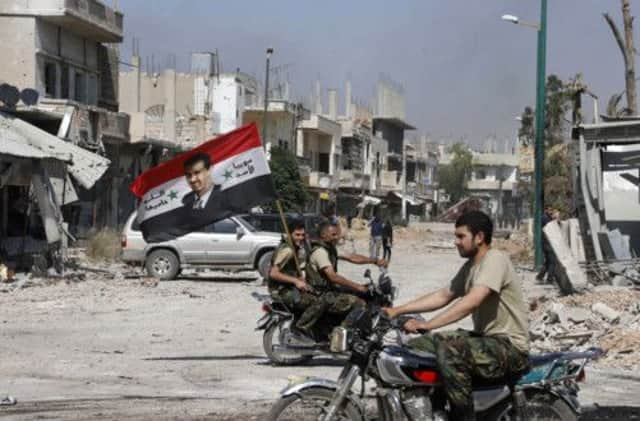Syria: Qusair falls to Hezbollah and Assad forces


Three weeks of heavy fighting reduced much of the town to rubble. Yesterday Syrian soldiers gathered at the town’s bullet-riddled clock tower to celebrate.
“We will not hesitate to crush with an iron fist those who attack us. Their fate is surrender or death,” the Syrian armed forces command said in statement. “We will continue our string of victories until we regain every inch of Syrian land.”
Advertisement
Hide AdAdvertisement
Hide AdRebels in Qusair said more than 500 fighters had died in two weeks of combat, with a further 1,000 wounded, leaving just 400 outgunned men struggling to hold on to the town.
Facing determined Hezbollah guerrillas from neighbouring Lebanon, the survivors decided to escape in the night through a corridor that the attackers said they had deliberately left open to encourage flight.
Some bodies still lay in the street; at least three men appeared to have been executed.
The capture of Qusair secures an important corridor through the central province of Homs, which links the capital Damascus to the coastal heartland of Mr Assad’s minority Alawite sect, an offshoot of Shia Islam.
Bolstered by his Iranian and Russian backers, Mr Assad’s forces have launched a series of counter-offensives in recent weeks against mainly Sunni Muslim rebels battling to overthrow him and end his Alawite family’s four-decade reign.
A member of a pro-Assad Syrian militia said the military focus may now move to the northern province of Aleppo, which has been largely in rebel hands for the last year.
The support of Hezbollah, a Shia pro-Iranian group, appears to have given Mr Assad fresh impetus. Hezbollah was founded to fight Israel, but yesterday it welcomed the fall of Qusair.
“Today we proved without any doubt that the gamble to topple Syria is a delusional plan,” said deputy leader Naim Qassem.
Advertisement
Hide AdAdvertisement
Hide AdHowever, the head of the rebel Free Syrian Army warned it might hit back at Hezbollah in Lebanon. “Hezbollah fighters are invading Syrian territory. And when they continue to do that and the Lebanese authorities don’t take any action to stop them coming to Syria, I think we are allowed to fight Hezbollah fighters inside [Lebanese] territory,” Salim Idriss said.
Syrian artillery and aircraft had pounded Qusair in recent days, and humanitarian agencies warned this week that as many as 1,500 wounded were trapped there. Their fate remains unclear.
The rebels said in a statement they had pulled out “in face of this huge arsenal and a lack of supplies and the blatant intervention of Hezbollah”.
A security source with ties to Syrian forces said troops had left an escape route into nearby Debaa and the Lebanese border town of Arsal to encourage rebel fighters to quit Qusair, once home to 30,000 people.
“We are heading now to crush Debaa,” a Syrian soldier said.
In the Hezbollah stronghold of southern Beirut, residents set off fireworks as news of Qusair’s fall spread.
Unexpected obstacle on the road to Geneva peace conference
The fall of Qusair, which lies on a cross-border supply route with Lebanon, might make it harder to convince both sides to attend a proposed peace conference in the coming weeks, with president Bashar al-Assad’s fortunes on the rise and the opposition in disarray.
Signalling the diplomatic difficulties, international envoy for Syria Lakhdar Brahimi said in Geneva yesterday that the date for the conference had slipped back to July from June. “The only sticking point is ... the Syrian component of the conference,” he said after meeting US and Russian officials.
More than 80,000 people have been killed since the Syrian revolt erupted in March 2011, and 1.6 million refugees have fled a conflict that has fuelled sectarian tensions across the Middle East, spilled over into Lebanon and divided world powers.